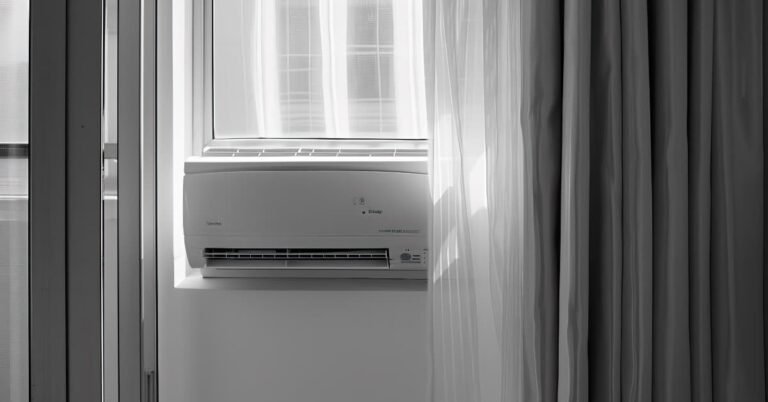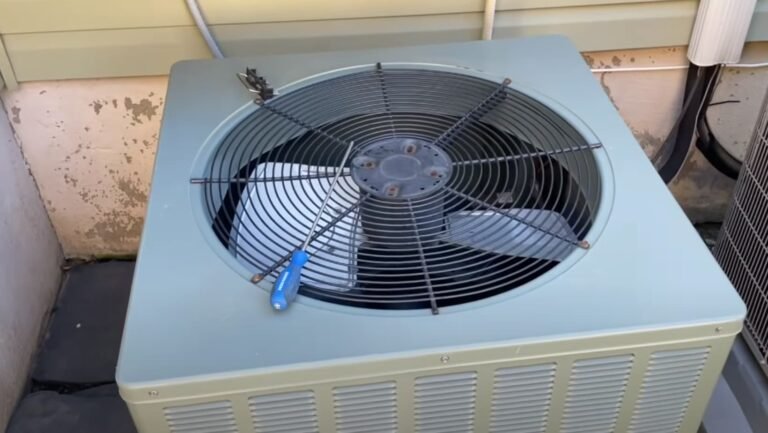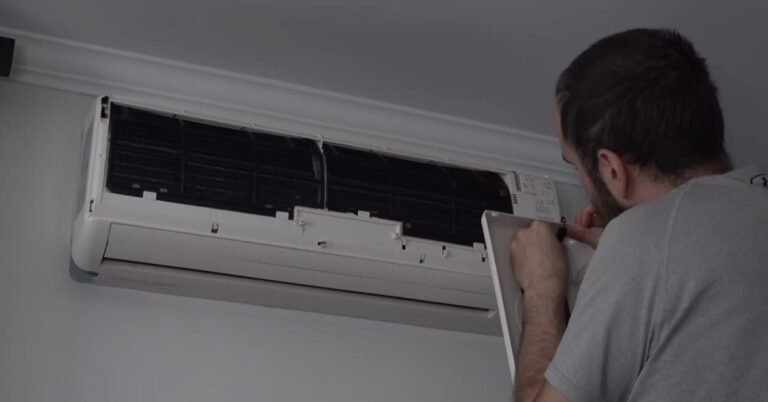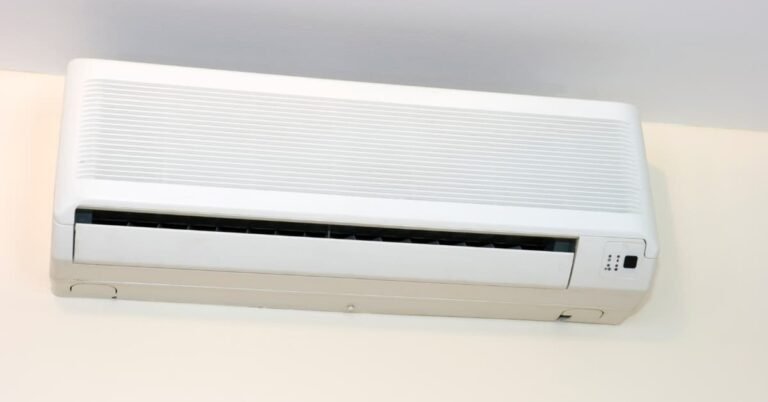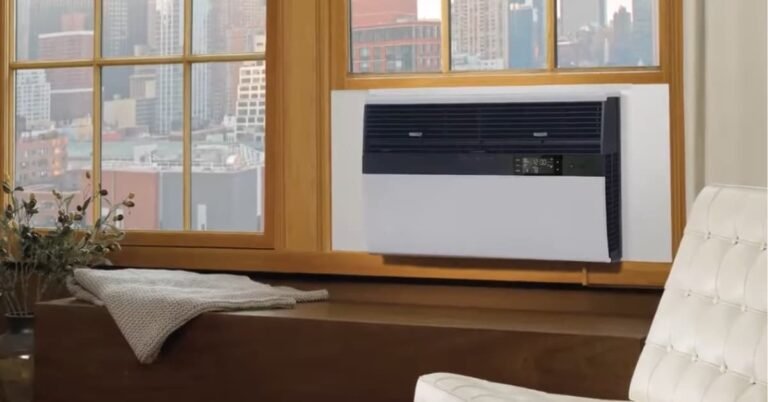LG Portable Air Conditioner Compressor Not Working- How to Fix
LG portable air conditioners are renowned for their robust performance and reliability. Like any device, they can encounter problems. One common issue is the compressor not working properly. The compressor is crucial for cooling and any malfunction can have a significant impact.
Troubleshooting this problem can be a daunting task for most people. Frequently, casual users feel lost when dealing with technical glitches like this. Therefore, understanding the potential causes and their solutions is significantly beneficial.
Now, we will go through this common problem with portable air conditioners.
LG Portable Air Conditioner Compressor Not Working
Are you experiencing issues with your LG Portable Air Conditioner compressor? Whether it’s a power problem, thermostat malfunction, dirty coils or filters, low refrigerant levels, faulty capacitors or relays, or fan motor issues, we have practical advice for each situation.
By following the below instructions restore optimal functionality to your LG portable AC and enjoy cool comfort again.
Power Issues
One common reason for an LG portable air conditioner compressor not working is power issues. If the unit is not receiving adequate power supply, the compressor may fail to operate properly. This can result in no cooling or insufficient cooling performance.
Before troubleshooting further, make sure to check and fix any power-related issues with the air conditioner.
How To Fix?
1. Check the power source: Ensure that the power cord is securely plugged into a functioning electrical outlet.
2. Circuit breaker check: Verify if the circuit breaker for the air conditioner’s power outlet hasn’t tripped. If it has, reset it.
3. Power supply capacity: Make sure that the electrical circuit supplying power to the unit has sufficient capacity to handle the air conditioner’s requirements.
4. Voltage fluctuations: Use a voltage meter to measure the voltage at the outlet where you’ve plugged in your air conditioner. Ensure it matches the required voltage level specified in the user manual.
5. Consider using a dedicated circuit: Large appliances like air conditioners often require their own dedicated circuit to prevent overload or interference from other electrical devices.
6. Contact an electrician if needed: If you’re unable to diagnose or resolve any electrical issues, consult a qualified electrician for further assistance.
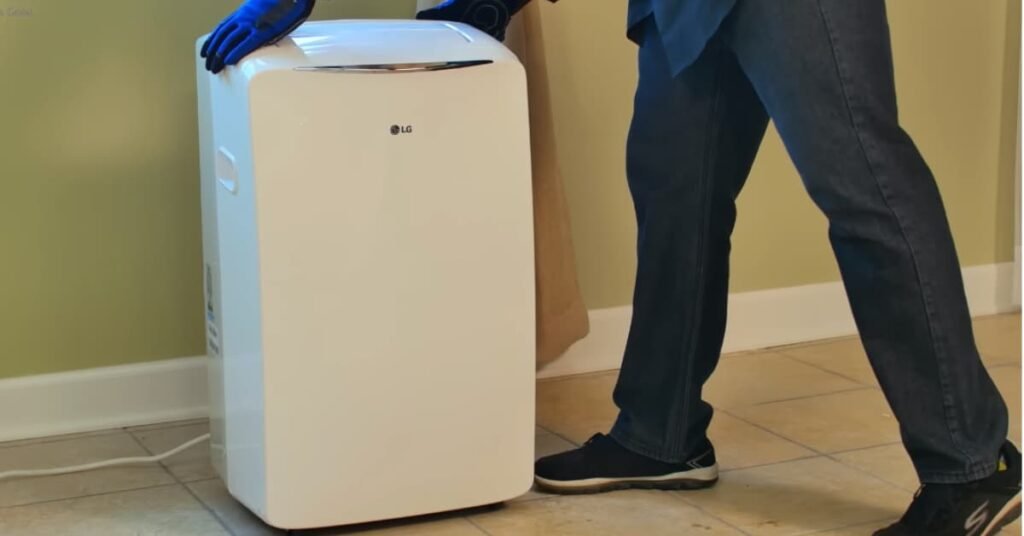
Thermostat Problems
Another potential cause of a non-functioning LG portable air conditioner compressor is thermostat problems.
The thermostat regulates temperature settings, so any malfunction can lead to incorrect operation or complete cooling failure.
How To Fix?
1. Check thermostat settings: Ensure that the thermostat is set to cool mode and at a temperature lower than room temperature.
2. Clean or replace batteries: If your thermostat runs on batteries, clean or replace them as needed since weak batteries can affect proper functionality.
3. Remove any obstructions: Make sure that the area around the thermostat is clear of any obstructions that may prevent proper temperature sensing.
4. Check for loose connections: Inspect and tighten any loose electrical connections between the thermostat and the air conditioner.
5. Calibrate or replace the thermostat: If you suspect a calibration issue, consult your user manual for instructions on recalibrating the thermostat. If calibration doesn’t resolve the problem, consider replacing it with a compatible one.
Low Refrigerant Level
Low refrigerant levels in an LG portable AC can cause compressor issues as refrigerant cools the system. A leak or improper refrigerant charge can lead to insufficient cooling or compressor failure.
How To Fix?
1. Detecting refrigerant leaks: Inspect the system for any visible signs of refrigerant leakage, such as oil or frost buildup.
2. Consult a professional: Refrigerant handling requires specialized knowledge and equipment. Contact a licensed HVAC technician to diagnose and fix any leaks and recharge the refrigerant if necessary.
3. Repair leaks: The technician will locate and repair any identified refrigerant leaks using approved methods to prevent further loss of refrigerant.
4. Recharge refrigerant: If the system is low on refrigerant due to a leak or other issues, the technician will recharge it with an appropriate amount as per manufacturer specifications.
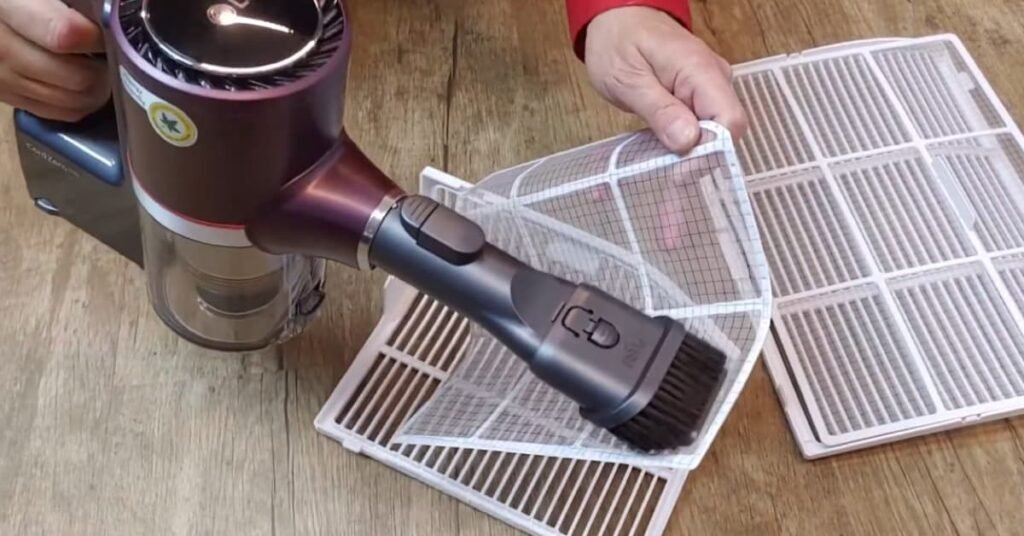
Dirty Coils/Filters
Dirty coils or filters can restrict airflow and affect the performance of the LG portable AC compressor. Dust, debris, and accumulated dirt on coils or filters can reduce cooling efficiency and potentially lead to compressor issues.
How To Fix?
1. Turn off and unplug the unit: Before addressing dirty coils or filters, ensure that the air conditioner is turned off and unplugged for safety.
2. Clean or replace filters: Remove any washable air filters from their housing and clean them according to the manufacturer’s instructions. If filters are not washable, replace them with new ones.
3. Clean evaporator/condenser coils: Gently remove dirt, dust, or debris from both sides of the coils using a soft brush or vacuum cleaner. Take care not to bend or damage the coil fins.
4. Use coil cleaner if necessary: For stubborn grime buildup on coils, apply a mild coil cleaner following product instructions carefully.
5. Reassemble and plug in: Once all components are cleaned and dry, reinstall them into their respective positions following manufacturer guidelines.
6. Regular maintenance: To prevent future issues with dirty coils or filters, perform regular cleaning as recommended by LG to maintain optimal airflow.
Faulty Capacitor or Relay
A faulty capacitor or relay in the LG portable AC can cause compressor failure by disrupting electrical flow within the unit. Capacitors store electrical energy, while relays control the flow of electricity from the power source to various components.
How To Fix?
1. Power off and unplug: Prioritize safety by turning off and unplugging the air conditioner before troubleshooting capacitors or relays.
2. Visual inspection: Examine capacitors for signs of bulging, leaking, or damage. Inspect relays for burnt marks, loose wires, or signs of corrosion.
3. Replacement parts: If you suspect a faulty capacitor or relay, consult your user manual for compatible replacement part numbers.
4. Gather necessary tools: Ensure you have the appropriate tools such as screwdrivers or pliers for safely removing old components and installing new ones.
5. Follow safety instructions: Before replacing parts, follow all safety guidelines provided by LG.
6. Install new capacitor/relay: Carefully remove the damaged component and insert the replacement part according to manufacturer instructions.
7. Reassemble and test: Once all repairs are complete, reassemble the unit and plug it in to test if the compressor is working properly.
Fan Motor Problems
A faulty fan motor can cause the LG portable AC compressor to not work properly. The fan motor is responsible for circulating air through the system and aiding in cooling. If the fan motor malfunctions, it can cause insufficient airflow or compressor failure.
How To Fix?
1. Check for power supply: Ensure that the unit is receiving power by checking the electrical connections and cables.
2. Inspect the fan motor: Look for any visible signs of damage or obstruction, such as debris or a loose fan blade. If necessary, clean or tighten these components.
3. Test the motor capacitor: The fan motor may have a capacitor that helps start and run it smoothly. Use a multimeter to check if it has failed. If so, replace it with a new one.
4. Seek professional help: If you are unable to diagnose or fix the issue yourself, contact a qualified technician who specializes in air conditioner repairs.
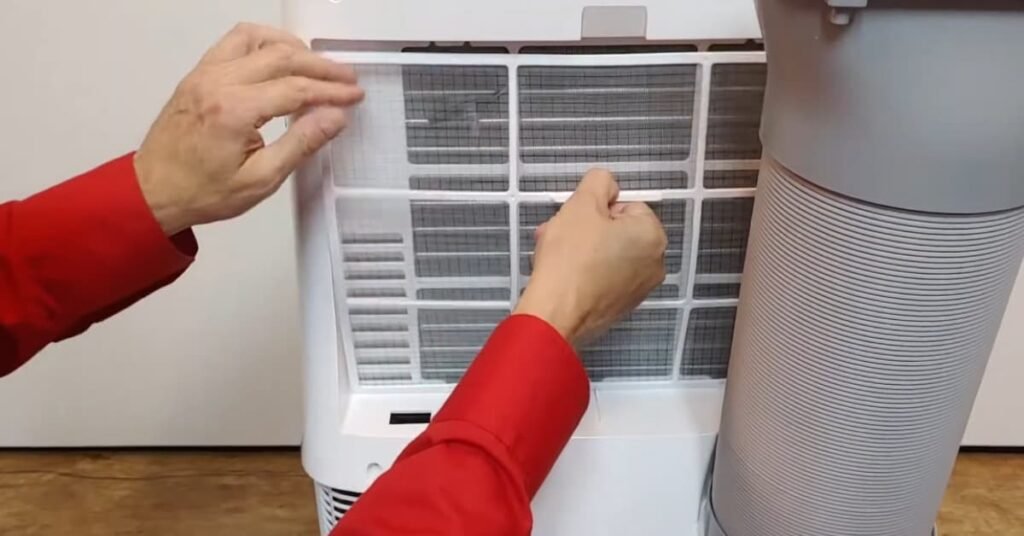
Compressor Overload/Protection
Compressor overload or protection can be another reason for LG portable air conditioner compressor failure. This feature is designed to shut down the compressor when overloaded due to factors like high temperature or excessive pressure.
How To Fix?
1. Allow cooldown time: Turn off the unit and let it cool down for approximately 10-15 minutes before attempting to restart it.
2. Check for obstructions: Ensure that nothing is blocking the airflow around the condenser coil.
3. Clean filters and coils: Dirty filters or coils can lead to increased strain on the compressor, triggering overload protection. Clean or replace them as necessary.
4. Reset error codes: Some models have an error code display panel that indicates overload conditions requiring reset procedures. Refer to your user manual for specific instructions.
5. Air conditioner reset: Switch off the air conditioner, unplug it from the power source, wait for a few minutes, and then plug it back in. Turn on the unit and check if the compressor starts running.
6. Consult a professional: If the overload continues to occur frequently or if you’re unsure about performing further troubleshooting steps, contact a qualified technician for assistance.
Electronic Control Board Failure
An electronic control board failure can affect various components in an LG portable AC, including the compressor. The control board is responsible for regulating and coordinating system operations based on user settings.
How To Fix?
1. Verify power supply: Make sure the air conditioner is connected to a functioning power outlet.
2. Check for error codes: Some models have error code displays that provide insight into specific issues with the control board. Refer to your user manual for error code meanings and potential solutions.
3. Reset settings: Turn off the air conditioner, disconnect it from power, wait for a few minutes, and then reconnect it. This can sometimes reset the control board and resolve minor glitches.
4. Contact customer support: If resetting doesn’t solve the issue or if you suspect a more serious problem with the control board, reach out to LG customer support or schedule service with an authorized technician.
Mechanical Failure
Mechanical failures within the compressor itself can cause it to stop working properly. These failures can be due to wear and tear over time or other internal defects.
How To Fix?
1. Diagnosis by professional technician: Consider scheduling a visit from an experienced HVAC technician who can assess and diagnose any mechanical failures within the compressor.
2. Replacement of faulty components: If identified as a mechanical issue, specific parts within the compressor may need replacement to restore proper functionality.
3. Repair versus replacement: Depending on the severity of mechanical failure and the age of the unit, it may be more cost-effective to replace the entire air conditioner rather than repairing individual components.
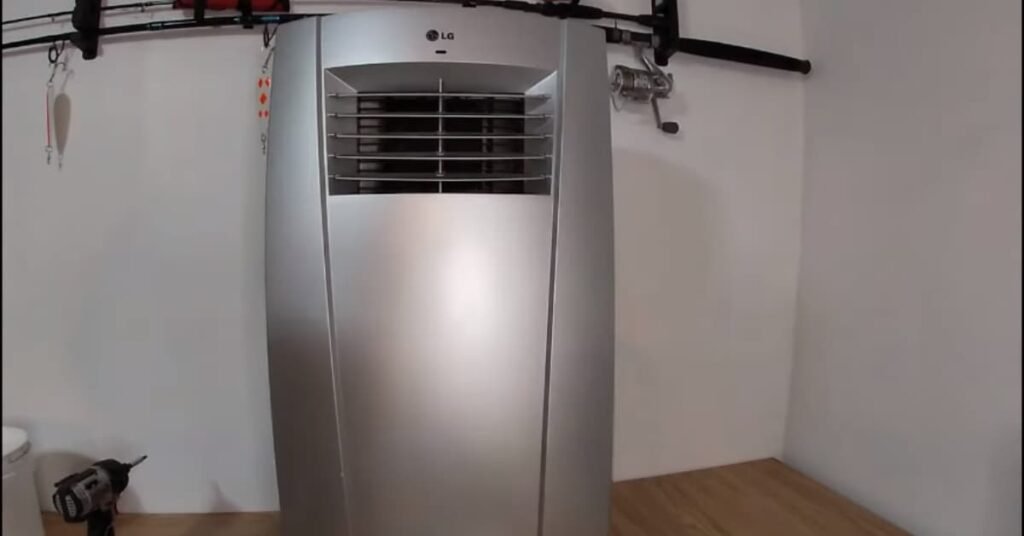
Improper Installation
Improper installation of an LG portable air conditioner can lead to various issues, including compressor malfunctions. Incorrect installation can strain the compressor and other components, causing them to fail prematurely.
How To Fix?
1. Professional installation: If you suspect improper installation, consider contacting a qualified HVAC technician to inspect, assess, and potentially reinstall the unit correctly.
2. Review the user manual: Ensure that you understand all installation requirements outlined in the user manual. Follow these instructions carefully during reinstallation or adjustment.
3. Inspect for potential issues: Check for any visible signs of problems such as loose connections, improper positioning, or blocked airflow. Address these issues accordingly.
4. Seek professional guidance: If you are uncertain about proper installation procedures or encounter any complications during reinstallation attempts, consult with a professional for guidance.
How Do I Know If My AC Compressor Is Faulty?
Determining whether your AC compressor is faulty requires close attention to certain signs and symptoms.
One common indicator is a weak airflow coming out of the vents. If the air is weaker or your space takes longer to cool, it could indicate compressor issues.
Another sign is unusual noises, such as grinding, squealing, or banging sounds during operation.
Also, check any leaks around the compressor unit and frequent on-and-off cycling of the AC unit.
If you notice any of these signs, it is advisable to consult a professional technician for proper diagnosis and repair.
Where is the compressor reset button?
The compressor reset button is not present in all AC units, so it’s best to contact a professional technician for any issues with your AC compressor.
They will have the necessary expertise to diagnose and address any problems with the compressor.
How Do I Test My Car Air Conditioner Compressor?
To test your car air conditioner compressor:
1. Start the engine and turn on the AC.
2. Listen for unusual noises, like squealing or grinding.
3. Check if the compressor clutch engages and disengages.
4. Feel the AC tubing for cold air.
Conclusion
A malfunctioning LG portable air conditioner compressor can be attributed to various factors. Power issues, thermostat problems, dirty coils/filters, low refrigerant level, faulty capacitors or relays, and fan motor problems are potential causes.
By following the troubleshooting guides provided for each issue, users can effectively address and resolve problems.
Regularly checking power supply, cleaning filters and coils, and inspecting components for damage or obstruction are essential maintenance practices. Seeking professional help if needed is also recommended.
By promptly addressing issues, users can efficiently enjoy cool and comfortable indoor environments throughout warmer seasons.


